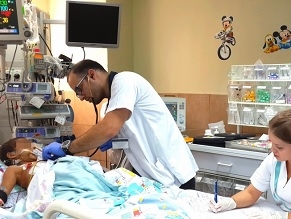|
World Jewish News

Israeli hospitals have treated thousands of wounded who have managed to cross the border into the Golan Heights
|
Chemical weapon attack in Syria: Israel's President Rivlin recalls the Holocaust
06.04.2017, Israel and the World ‘’When I saw pictures of babies suffocating from a chemical attack in Syria, I was shocked and outraged,’’ said Israeli Prime Minister Benjamin Netanyahu as Israeli leaders from across the political spectrum condemned a chemical weapon attack carried out by the Syrian regime.
At least 58 people, including 11 children, were killed in the incident, though some unconfirmed reports have put the death toll closer to 100.
A nerve agent, thought to be sarin, was dropped from warplanes over Khan Sheikhoun, a city in the hands of the rebels in the Idlib district of Syria, by forces loyal to Syrian President Bashar al-Assad.
Netanyahu “sharply condemned” the attack and called on the international community to complete the process of removing all of Syria’s chemical weapons stockpiles.
Recalling the Holocaust, Israel’s President Reuven Rivlin said that Israel cannot remain indifferent to the gassing of Syrian civilians and he offered to help survivors of the civil war.
“We, as a people who survived the greatest of atrocities and rose from the ashes to be a strong and secure nation, we will do all we can to continue to aid the survivors of the horrors in Syria,” he said in a statement. “We know all too well how dangerous silence can be, and we cannot remain mute.”
Education Minister Naftali Bennett called on Netanyahu to convene an emergency meeting of the security cabine, saying: “The use of chemical weapons against civilians requires Israel’s security cabinet to rethink its stance.” He also called US President Donald Trump to lead an international effort to stop the “chemical massacre”.
Deputy Foreign Minister Tzipi Hotovely: “Avoiding military involvement in Syria does not contradict diplomatic engagement to end the atrocities.”
Though Israel has stayed on the sidelines of the Syrian War, it has carried out intermittent strikes to prevent the transfer of sophisticated missiles to Hezbollah and prevent the establishment of Hezbollah military infrastructure in Southern Syria. Israeli hospitals have also treated thousands of wounded who have managed to cross the border into the Golan Heights.
Israeli Deputy Foreign Minister Tzipi Hotovely said: “Israel was right these past six years in not getting militarily involved in the Syrian conflict. Nevertheless, the situation in Syria requires action in the diplomatic arena. Israel can engage with its friends in the world to work towards putting a stop to these atrocities. Israel doesn’t turn its back on the wounded in Syria. We have treated and continue to treat wounded Syrian children in Israeli hospitals.”
The chemical weapon attack in Syria has been heavily analysed by Israeli security experts and commentators, including the possibility of an Israeli military response.
Writing in daily Yediot Ahronot, security commentator Yossi Yehoshua stressed the “immediate action that needs to be taken is to increase Israeli humanitarian activity vis-à-vis Syria, along with diplomatic activity with a demand for effective international involvement over there”.He also evaluated the option of an Israeli military intervention “that will signal to the Syrian regime that such an act is unacceptable to Israel and that whoever carries it out will pay the price”.
Eschewing the possibility of a ground troop operation, Yehoshua nonetheless noted that “there are several other options in the IDF toolbox” and cited former director of Military Intelligence Amos Yadlin as a supporter for such an intervention. Speaking to Army Radio, Yadlin was one of the few people to urge direct action against Assad, calling the chemical attack a “crime against humanity” and encouraged Israel to destroy the planes used in Idlib “from afar,” in an apparent reference to a missile attack.
However, Yehoshua was quick to note that Israel’s top security echelon feel it is neither prudent nor appropriate for Israel to intervene militarily in the conflict.
Former Mossad director Efraim Halevy told Army Radio: “The Israeli intelligence establishment knows very well what is happening in Syria, and more or less what is located there, I don’t think that there is any chance of intervention.”
EJP
|
|
